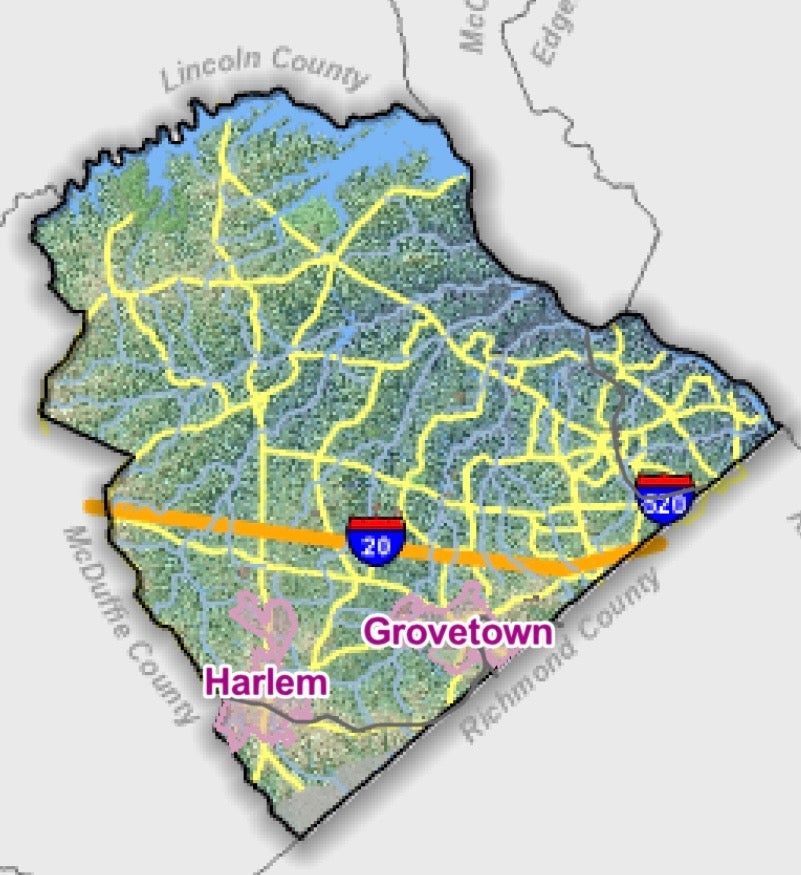During its yearly planning advance meeting on Nov. 17, the Columbia County Board of Commissioners (BOC) discussed the possibility of consolidating and incorporating the county—particularly, whether to seek legislation at all for making Columbia County a city, said county manager Scott Johnson.
The commissioners took no action nor cast any votes during the meeting, but this was not where their deliberations on the prospect of consolidation and incorporation began. Last year the BOC approved spending $100,000 on a study to assess the financial viability of establishing a new city and consolidating it with Columbia County.
Earlier this year, results of that study, conducted by Valdosta State University, found the endeavor fiscally feasible.
“It doesn’t mean that it’s a good idea,” said Johnson. “And it does not mean we’re going to do it. It means it’s fiscally feasible.”
MORE: Study finds that consolidation, incorporation of Columbia County is fiscally feasible
Johnson notes that incorporating and consolidating the county was not his idea, but that the commissioners have been merely considering it—” if [I] had an agenda on this, I’d be out there promoting it everywhere… I haven’t done it. The reason I haven’t done it is because my board of commissioners hadn’t said we’re moving forward with it yet”—but he also acknowledges that the potential financial benefits of incorporation and consolidation is a key impetus for the BOC’s exploring the possibility.
He notes that a consolidated Columbia County government could garner $8 to $12 million it currently doesn’t take in, from franchise fees from utilities. Only incorporated areas—cities, like Harlem and Grovetown—can collect franchise fees.
“If we could get an additional $8 to $12 million a year, we could lower property taxes in Columbia County for all citizens, not just in the new consolidated government,” Johnson said. “We could lower [taxes] for Harlem and Grovetown as well. We could continue to roll back our millage rate at a more aggressive level by replacing that revenue with a revenue that’s already there.”
MORE: Columbia County moving forward with study looking into incorporation and consolidation
A hypothetical consolidated Columbia County, Johnson explains, would be contrasted from Augusta’s consolidation with Richmond County in 1996, in that Richmond County did not incorporate a new city, but only consolidated with an existing city, effectively merging two governments.
“The way to combat that is to consolidate the city with the existing county government,” said Johnson, noting that the county is considering incorporating at 11:59 p.m. one day, and consolidating at 12:01 a.m. the following day, with legislation that would keep the Board of Commissioners in charge of the new consolidated government. “We wouldn’t have a mayor and council. We wouldn’t have a police department, we wouldn’t need an additional fire department. We wouldn’t need another layer of government.”
The new entity would have the same commissioners and operate with the same employees, with no new departments, elected officials or new taxes. The only difference citizens would feel, Johnsons said, is that the people currently living in unincorporated areas would benefit from the franchise fees collected.
“You and I are paying it, but we’re not getting it back unless we live in a city,” he said, “Which is why we’re looking at making Columbia County a city. Practically nothing else changes.”
The BOC’s next step to move forward would be to vote on requesting the General Assembly draft legislation to incorporate a new city and consolidate with the county. Part of the discussion of the matter during the planning advance meeting was reviewing a piece of boilerplate legislation—sent to the county by the legislature preemptively, without request from the BOC.
The drafted bill is currently riddled with red ink noting areas the commissioners would change: a references to the “City of Columbia” are crossed out, along with those of a mayor and the potential powers thereof, and the sides are riddled with marginalia indicating the continuance of the current government. The final note reads: “This is needs work and input from the public.”
A series of efforts to inform residents—town halls and education sessions—are to be part of the process, Johnson stated, as he has said since the first public mention of consolidation. The commissioners would have until January, when the Assembly’s session starts, to vote in a public hearing to request a draft bill from Atlanta.
Should the BOC do that, then the community would be informed and invited to provide input as the county would go about drafting the legislation for which it would seek approval from the state. If the state were to approve the legislation in 2025, another bill would go through allowing citizens to vote on it.
“If they passed that, then the citizens would vote in November of 2026,” said Johnson. “If they approved it, it would become effective in January of 2027, and if they rejected it, then it would just go away.”
A county Republican party question on the primary ballot for May 21, 2024 election asked voters if they supported the incorporation of Columbia County. The results were close, with it receiving 4,366 yes votes (49.7%) and 4,408 no votes (50.2%).
Skyler Andrews is a reporter covering business for The Augusta Press. Reach him at skyler@theaugustapress.com.










